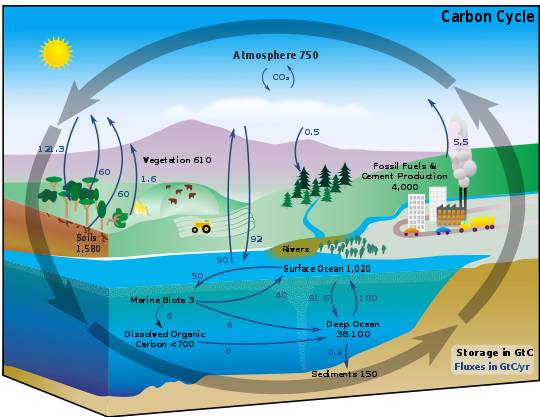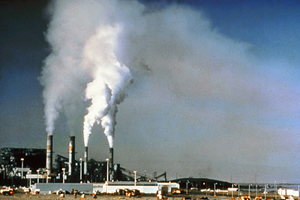Impact of Fossil Fuels on Society and the Environment
Because fossil fuels are so crucial to our day-to-day lives, and to national economies, they are used extensively in just about every part of the world. They are a necessary part of our society, but like many things, they come with environmental consequences. These tabs go over some environmental consequences of fossil fuel use.
Our dependence on fossil fuels



What do you think could happen if there was a fossil fuel shortage? What if we could not get the oil we need to run our cars? What if we could not get the coal we need to power our power plants? What if we had no natural gas for cooking our food and heating our homes?
Clearly fossil fuels play an important role in our society and our culture because they make working, playing, and surviving possible. Fossil fuels supply our electricity. Nearly half of the world’s electricity comes from burning coal alone, though oil and natural gas also contribute their fair share. Fossil fuels make modern transportation possible. We mostly take it for granted that we can drive across the country and stop whenever we need to fill up our cars with gas. We also take it for granted that shipping trucks can do the same, in order to bring fresh vegetables to our grocery stores, shipments of new clothes to the malls, and packages from around the world. Fossil fuels are our leading source of power to heat and cool our homes. If you live in a cold climate, you know how good it feels to be able to switch the heat on in your home. Or maybe you live somewhere with sweltering summers and you appreciate being able to run the air conditioner. All of this is possible because of fossil fuels. So, what would a day without fossil fuels be like? Think about that for a minute.
Impact on the carbon cycle

But fossil fuels have several large environmental impacts. The biggest of these is how they impact Earth’s carbon cycle. Remember that as long as fossil fuels are buried in Earth they have no interaction with the environment. But as soon as we dig them up and burn them, they release massive amounts of stored carbon into Earth’s atmosphere. This disrupts the natural balance of carbon on Earth. The carbon dioxide gas that fossil fuel combustion sends up into the air is a major contributor to Earth’s enhanced greenhouse effect and global warming. This, in turn, has implications for sea level rises, wildlife, and human populations. Fossil fuel combustion also contributes to several types of air pollution. The incomplete combustion of fossil fuels produces carbon monoxide gas, which is toxic to humans. The combustion of fossil fuels releases sulfur and nitrogen compounds and toxic mercury. The sulfur and nitrogen form acids in the atmosphere and produce acid rain. The mercury is poisonous and can accumulate in our bloodstreams. Also, the use of crude oil often leads to oil spills on land and water. Oil spills can be deadly to wildlife, especially marine wildlife.
Avatar: Problems With Imports
So if fossil fuels are so bad for the environment, why do we continue to use them? First and foremost—they are cheap and easy to acquire, and secondly, we depend on them. Listen to this avatar for more information.
Solutions

To address the environmental and societal problems associated with fossil fuel use, we have come up with several possible solutions. One of these is to simply use less energy. Another is to rely more on non-fossil fuel sources of energy, such as hydro power, solar power, and wind power, all of which you learn about later in this unit. Another solution is to come up with technology that prevents some of the pollution associated with fossil fuels. For example, that billowing cloud of smoke that you see coming out of a power plant’s smokestack is called flue gas. It contains carbon dioxide, sulfur and mercury pollutants. Flue gas can be treated to remove carbon dioxide and sulfur as it leaves the smokestack. One of these treatments is called a wet scrubber, which works by spraying flue gas with limestone and water to remove sulfur. Carbon dioxide can then be cooled and condensed to a liquid and buried deep underground for long-term storage. Currently, however, the technology required to remove carbon dioxide from coal on a large scale is too expensive to make it useful for most power plants. And the question of what to do with the carbon dioxide that gets removed from the emissions has not been answered. It does not go away; it just gets stored somewhere else.